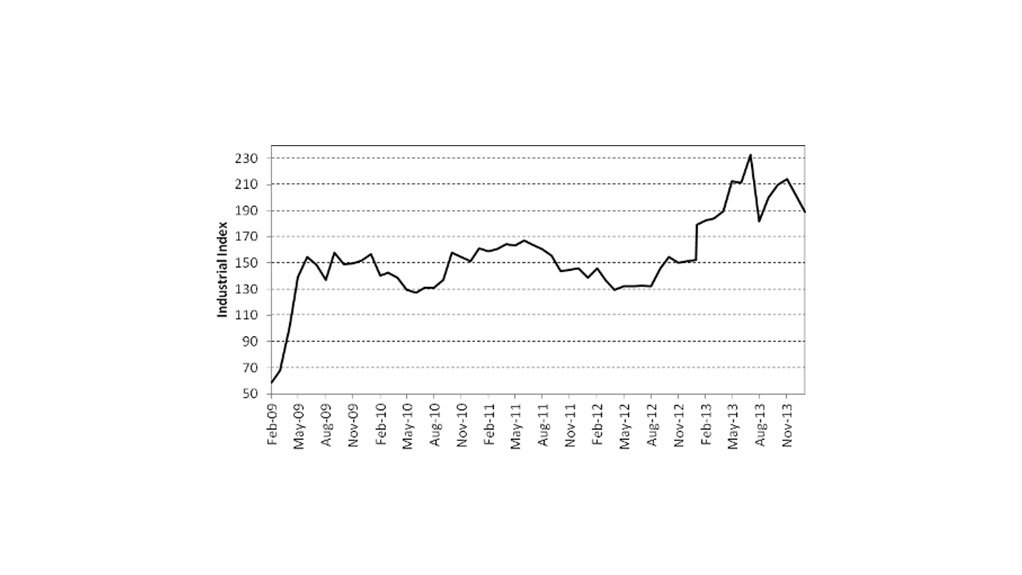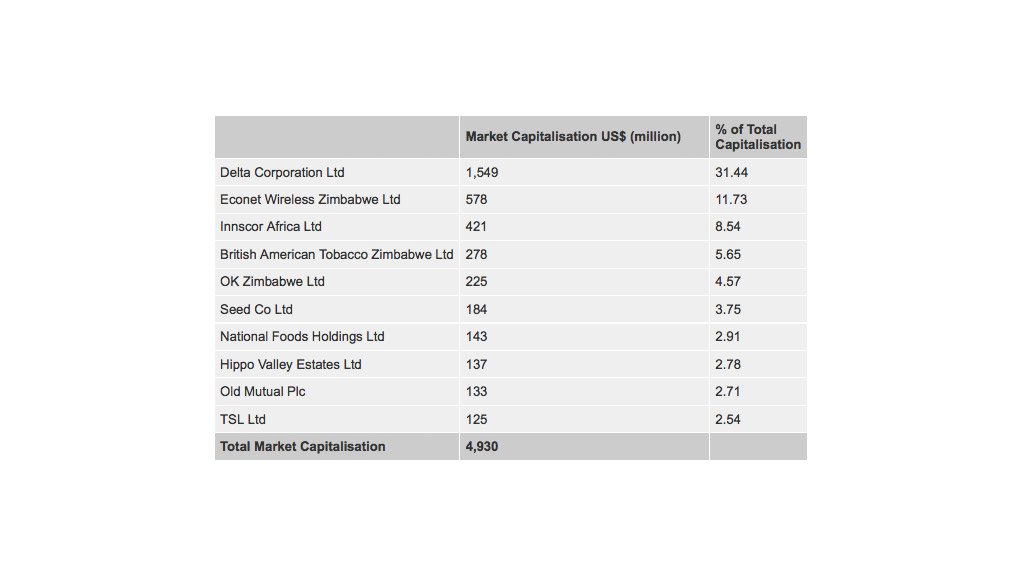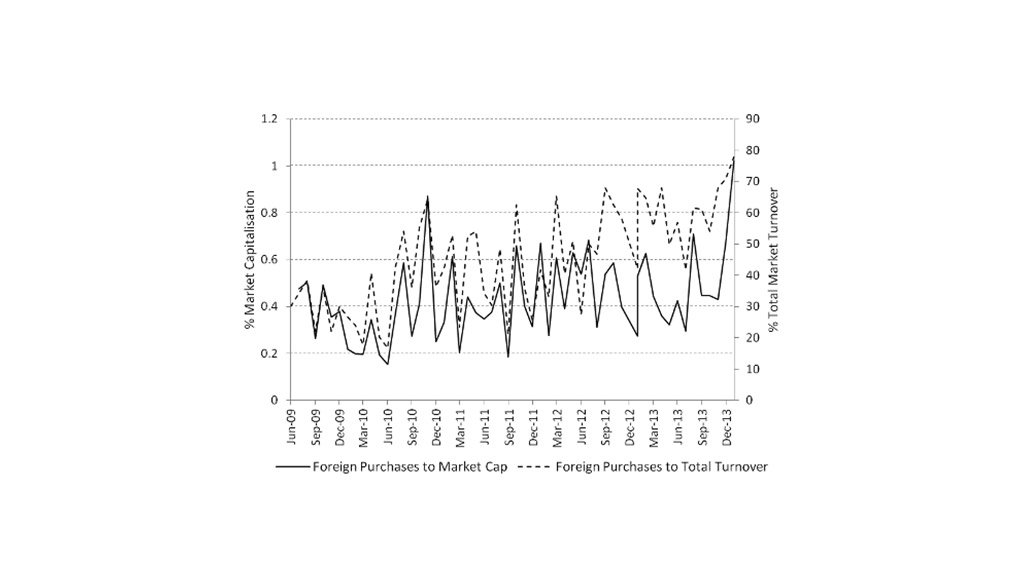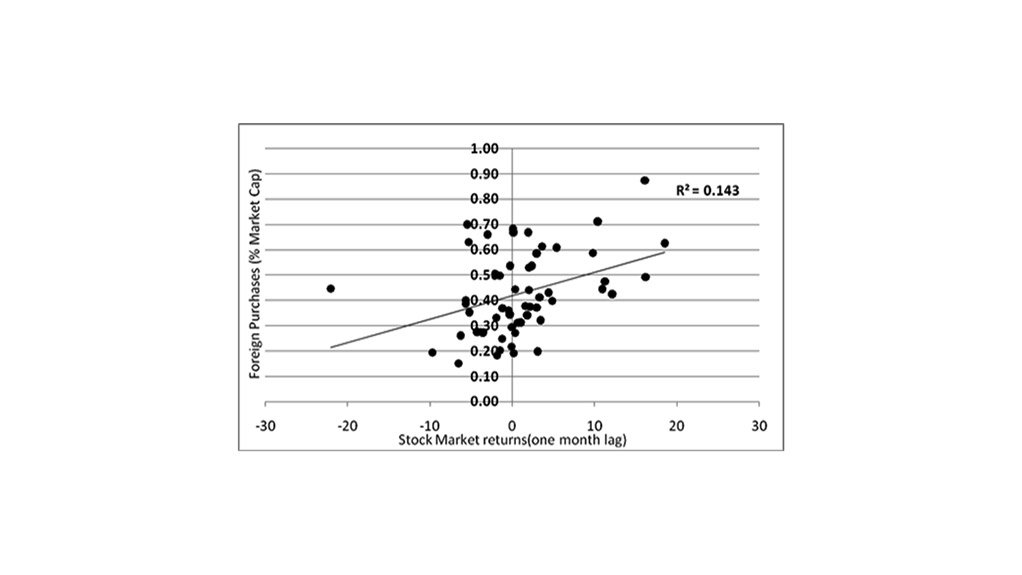A country’s economic growth is usually associated with growth in its capital markets and its ability to attract capital from abroad. International portfolio investments allow investors to participate in the growth of other countries through the purchase of securities such as treasury bills, shares, foreign currency and debentures in foreign capital markets.(2) This paper focuses on the trade in shares and equity on Zimbabwe’s capital market as these are the country’s most active and developed financial instruments to raise short and long term finance by corporate bodies. The market for other financial instruments is not well developed and does not function efficiently; for instance, the Treasury Bills market, dominated by the government of Zimbabwe, has not been active and successful because of scepticism about the government’s ability to honour payments at maturity.(3)
Zimbabwe adopted a multicurrency system in January 2009 with four currencies as legal tender, namely the British pound, South African rand, the Botswana pula and the United States dollar. This came after the economy faced liquidity challenges, which have affected the investment decisions of local investors and resulted in foreign investors accounting for the bulk of total market turnover. However, because of the volatility of foreign investments on the market, questions have been raised as to whether the flow of foreign investment on the stock market responds to the performance of the market or is determined by factors outside the market.(4) Therefore, this paper seeks to investigate the relationship between the performance of the Zimbabwe Stock Exchange (ZSE) and the participation of foreign investors on the exchange.
Background of the Zimbabwe Stock Exchange
The ZSE was established in 1896 with the intention to meet the capital needs of the gold mining industry, whose rapid expansion was fuelled by speculation of a major gold rush in Southern Rhodesia (now Zimbabwe).(5) By February 2014, the exchange had 67 listed companies, marginally higher than the 64 companies listed in December 1996. There were 79 listed companies in 2008 but this number declined as many firms were delisted for failing to meet exchange rules and regulations, especially the Zimbabwe Stock Exchange Act (Chapter 24:18) and a corporate governance framework which requires that listed firms make public their audited financial statements within six months of the end of their financial years.(6) The exchange provides a platform and means for raising capital for both domestic and international companies through the issuance of equity and debentures to individual and institutional investors, such as pension funds, banks and asset management firms. The ZSE became a significant capital market only in the 1990s, after the introduction of market reforms in the form of the Economic Structural Adjustment Programme (ESAP) adopted in 1991. These reforms provided a strong stimulus for trading volumes on the ZSE, and included the lifting of restrictions on foreign investment controls to a level equivalent to about 40% of the annual turnover of the ZSE. However, they have since been relaxed.(7)
Between 2002 and 2008, the Zimbabwean economy went through a period of economic turmoil and declining performance. Despite the shrinking economy, the stock market responded inversely to the factors that affected the economy negatively. Speculation drove the exchange’s performance as investors hedged against hyperinflation, which reached an all-time high of 231 million percent in July 2008. Investors sought stock market shares as a store of value for their investment.(8)
As the Zimbabwean dollar continued to lose its value as legal tender in late 2009 due to hyperinflation, speculative activities on the ZSE increased, prompting the government to suspend trading activities of the local bourse in November 2008 for three months. The government subsequently introduced a multiple currency exchange rate regime that adopted the pound, rand, pula and dollar as legal tender. This enabled the suspension on trading activities to be lifted in February 2009, resulting in the resumption of trading and the settlement of deals in dollars.(9)
Performance of the Zimbabwe Stock Exchange
Fig 1: Monthly perfomance of the Zimbabwe Stock Exchange Industrial Index (2009–2013) (10)
Trading on the ZSE is dominated by blue chip counters. The top 10 counters in terms of market capitalisation accounted for 76.6% of total market capitalisation as at 20 February 2014.(11) They are shown in the following table.
Fig 2: Top ten counters by market capitalisation (12)
The total turnover ratio (turnover expressed as a percentage of market capitalisation) increased from 0.18% in February 2009 to 1.95% in July 2012 before declining to 0.95% in December 2013. This indicates that the rate at which shares exchanged hands on the stock market between July 2012 and December 2013 declined, implying decreased interest to trade on the local bourse. In addition, it reflects that the market was becoming more illiquid and investors were finding it difficult to buy and sell stocks if they wanted to.(13) The increase in the turnover ratio between 2009 and 2012 was in response to an improving economic environment as the Zimbabwe Government adopted market-based economic policies in a bid to revive the economy. However, between the same periods, the turnover ratio exhibited volatility related to the implementation of the indigenisation policy. On the other hand, the decline in the turnover ratio from July 2012 to December 2013 came on the back of a liquidity crunch attributed to the underperformance of the major sources of liquidity, such as export earnings, international remittances and offshore lines of credit. This affected investment decisions of both local and foreign investors as it became difficult to buy and sell stocks with ease.
Foreign investor participation on the ZSE
The liberalisation of the Zimbabwean economy from 1991 to 1996 during the ESAP allowed foreigners to purchase shares on the ZSE subject to a 25% limit on a listed company. The restrictions were later raised to a level equivalent to about 40% of the annual turnover of the ZSE but have since been relaxed.(14) Foreign investors can now participate on the ZSE without prior exchange control approval, provided that their capital passes through normal banking channels. Shares purchased on behalf of foreign investors are registered either in their own names or the names of a nominee company and the share certificates, once registered, are endorsed as “Non-resident.”(15)
While the total turnover ratio of the ZSE has been declining, the turnover ratio for foreign purchases increased from 0.48% in June 2009 to 1.31% in January 2014. This implies that foreign investors showed increased interest in trading on the ZSE, were highly active and liquid, and faced no difficulties in selling or buying stocks on the market.(16) This came on the back of a liquidity crunch in the local economy, which affected investment decisions by local investors. The liquidity crunch has been attributed to the underperformance of the major sources of liquidity and broad money supply, such as export earnings, international remittances and offshore lines of credit.(17) This liquidity squeeze has enabled foreign investors to increasingly dominate trade on the ZSE. This is shown in the ratio of foreign turnover to total market turnover rising from 30% in June 2009 to 78% in January 2014.(18)
Fig 3: Foreign investors’ participation in the ZSE (19)
The downturn in the performance of foreign portfolio investment has been due largely to a shift in the risk premium on both the stock market and the economy. For instance, the decline in foreign turnover in September 2011 was due to the intensity of the implementation of the Indigenisation and Economic Empowerment Policy, and in July 2013 was due to the outcome of the harmonised general election, in which presidential, parliamentary and local government elections were held concurrently.(20)
Relationship between foreign investor participation and stock market performance
‘Positive feedback trading’ describes the strategy of rushing in when markets are booming and rushing out when markets are on the decline. The hypothesis predicts a relationship between past performance of the stock market as indicated by the value of the market index and current flows of portfolio investment; if positive feedback trading holds, there should be a relatively high correlation between foreign inflows and stock market performance.(21) A Kenyan study investigating the relationship between foreign portfolio flows and stock market performance of the Nairobi Stock Exchange found that the participation of foreign investors has an effect on domestic stock market returns and that stock market returns are affected by lagged unexpected flows.(22)
Thus, in our analysis of Zimbabwe, we seek to investigate the relationship between monthly foreign purchases and the previous month’s stock market returns (capital gains on the industrial index).
Fig 4: Foreign turnover ratio and stock market returns (23)
The results on the scatter plot above indicate a weak positive feedback between lagged monthly stock market returns and foreign participation on the ZSE. This finding is supported also by the results of a correlation matrix, which indicates a correlation coefficient of 0.31 between stock market returns and foreign purchases. This indicates a weak positive relationship between past month stock market returns and foreign investor participation. Meanwhile 14.3% of the movement in the value of shares bought by foreigners was explained by movements in the stock market returns, with the rest being determined by factors other than market returns, such as economic and political conditions.(24) These results seem to support the school of thought that investment decisions in African countries are based on political variables rather than economic reasoning due to the fact that politics in Africa dictates overall economic direction. Another interpretation of our results is that the foreign investors comprise mainly small and individual investors who make irrational investment decisions, and thus, they would buy and sell stocks at any time without considering market returns.(25)
Concluding remarks
The participation of foreign investors on the ZSE is determined by market fundamentals to a lesser extent than might be expected in other countries. Instead, most investment decisions are based largely on Zimbabwe’s prevailing economic and political conditions and the risks these pose to foreigners’ investments. Thus, Zimbabwean policymakers need to create an environment that enables foreign investors to base their decisions to invest in the local bourse on market fundamentals, rather than general political and economic factors.
Written by Gamuchirai Chiwunze (1)
NOTES:
(1) Gamuchirai Chiwunze is a Research Associate at CAI with interests and expertise in finance, macroeconomics, development economics and international trade. Contact Gamuchirai through Consultancy Africa Intelligence's Finance and Economy unit ( finance.economy@consultancyafrica.com). Edited by Nicky Berg.
(2) Odetayo, T.A. and Sajuyigbe, A.S., 2012. Impact of Nigerian capital market on economic growth and development. International Journal of Arts and Commerce, 1(5), http://www.ijac.org.uk.
(3) ‘Treasury Bill sale flops despite ultimatum’, News Day, Harare, 7 November 2012, https://www.newsday.co.zw.
(4) ‘Foreign buyers push ZSE best performance’, News Day, Harare, 11 December 2013, https://www.newsday.co.zw.
(5) Karekwaivenani, G., 2003, ‘A history of the Rhodesian Stock Exchange: The formative years, 1946-1952’, Department of Economic History, University of Zimbabwe, http://ir.uz.ac.zw.
(6) Oyama, T., ‘Determinants of stock prices: The case of Zimbabwe’, International Monetary Fund (IMF) Working Paper WP97/117, 1997, www.imf.org.
(7) Stringer, R., Kanyenze, G. and Chitambara, P., 2012. Pro-poor and inclusive development in Zimbabwe: Beyond the enclave, Ed. Labour and Economic Development Research Institute Zimbabwe (LEDRIZ), Weaver Press: Harare.
(8) Njanike, K., Katsuro, P. and Mudzura, M., 2009. Factors Influencing the Zimbabwe Stock Exchange performance (2002-2007), Annals of the University of Petroşani, Economics, 9(2), pp. 161-172.
(9) Chikoko, L. and Muparuri, W., 2013. Zimbabwe Stock Exchange and efficiency in the multiple currency exchange rate regime. Journal of Business and Economic Management, 1(3), pp. 41-47, http://academiapublishing.org; ‘Memorandum to the
Zimbabwe Stock Exchange Management’, Reserve Bank Of Zimbabwe, November 2008, http://www.rbz.co.zw.
(10) Graph compiled by author with data from the Zimbabwe Stock Exchange website http://www.zimbabwe-stock-exchange.com.
(11) Top 10 counters by market capitalisation as at 20 February 2014, Zimbabwe Stock Exchange, http://www.zimbabwe-stock-exchange.com.
(12) Ibid.
(13) Author’s own calculations from personal communication, Mafukidze, T., Trading officer, Zimbabwe Stock Exchange, Harare,3 February 2014.
(14) Kanyenze, G. and Kondo, T. (Es.), 2011. Beyond the enclave: Towards pro-poor and inclusive development in Zimbabwe. Weaver Press: Harare, Zimbabwe.
(15) ‘Zimbabwe Stock Exchange Trading Handbook 2012’, IH Securities, 2012, http://www.ihsecurities.com.
(16) ‘Stock market turnover’, The Economist, 9 August 2001, http://www.economist.com.
(17) ‘Zimbabwe: Multi-sectoral impact of liquidity crunch’, Newsday, Harare, 17 October 2013, https://www.newsday.co.zw.
(18) Author’s own calculations from personal communication, Mafukidze, T., Trading officer, Zimbabwe Stock Exchange, Harare, 3 February 2014.
(19) Graph compiled by author with data from personal communication, Mafukidze, T., Trading officer, Zimbabwe Stock Exchange, Harare, 3 February 2014.
(20) ‘ZSE loses $1 billion’, Daily News, Harare, 11 August 2013, http://www.dailynews.co.zw.
(21) Batra, A., ‘The dynamics of foreign portfolio inflows and equity returns in India’, Indian Council for Research on International Economic Relations, September 2003, http://icrier.org.
(22) Nyang`oro, O., 2013. Foreign portfolio flows and stock market performance In Kenya: Case of Nairobi Securities Exchange. School of Economics, University of Nairobi, Kenya, https://editorialexpress.com.
(23) Graph compiled by author with data from personal communication, Mafukidze, T., Trading officer, Zimbabwe Stock Exchange, Harare, 3 February 2014.
(24) Author’s own calculation using data from personal communication, Mafukidze, T., Trading Officer, Zimbabwe Stock Exchange, Harare, 3 February 2014.
(25) Xiao, X. and Kong, L., 2012. An empirical study on the relationship between turnover rate and stock returns in Chinese Stock Market. Advances in Information Technology and Management, 2(1), pp. 239-245, http://worldsciencepublisher.org.
EMAIL THIS ARTICLE SAVE THIS ARTICLE
To subscribe email subscriptions@creamermedia.co.za or click here
To advertise email advertising@creamermedia.co.za or click here



















